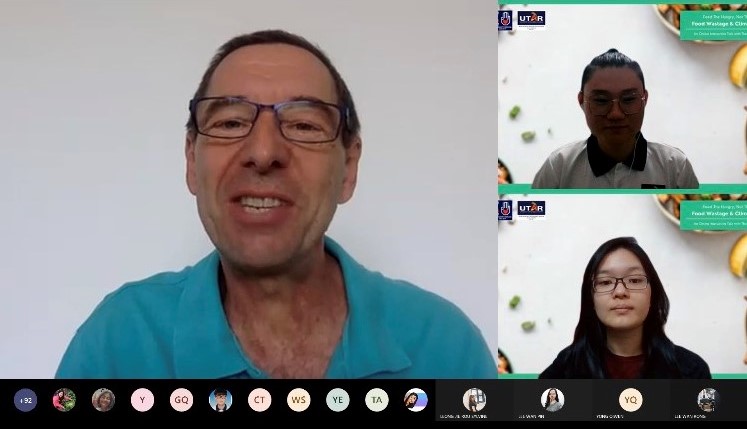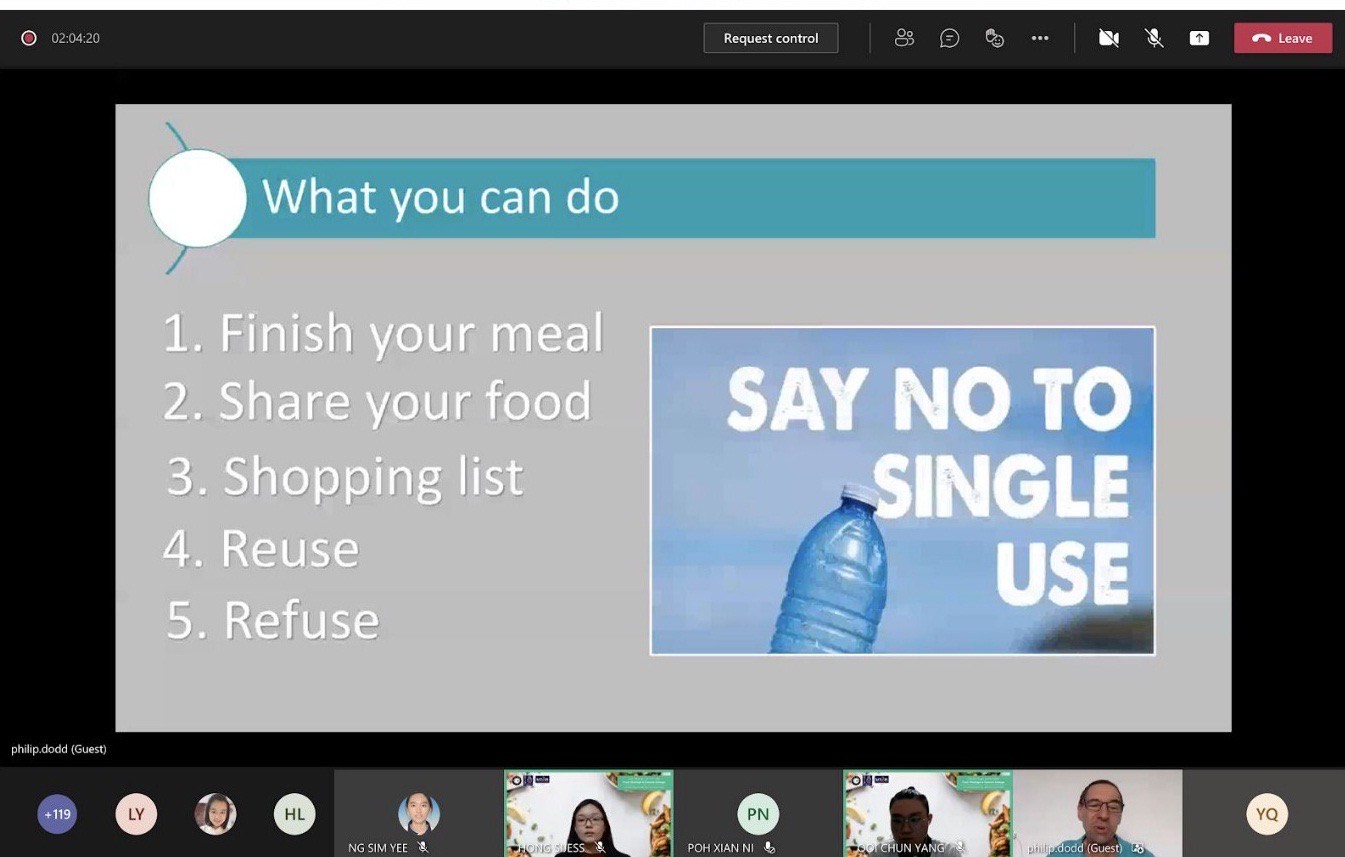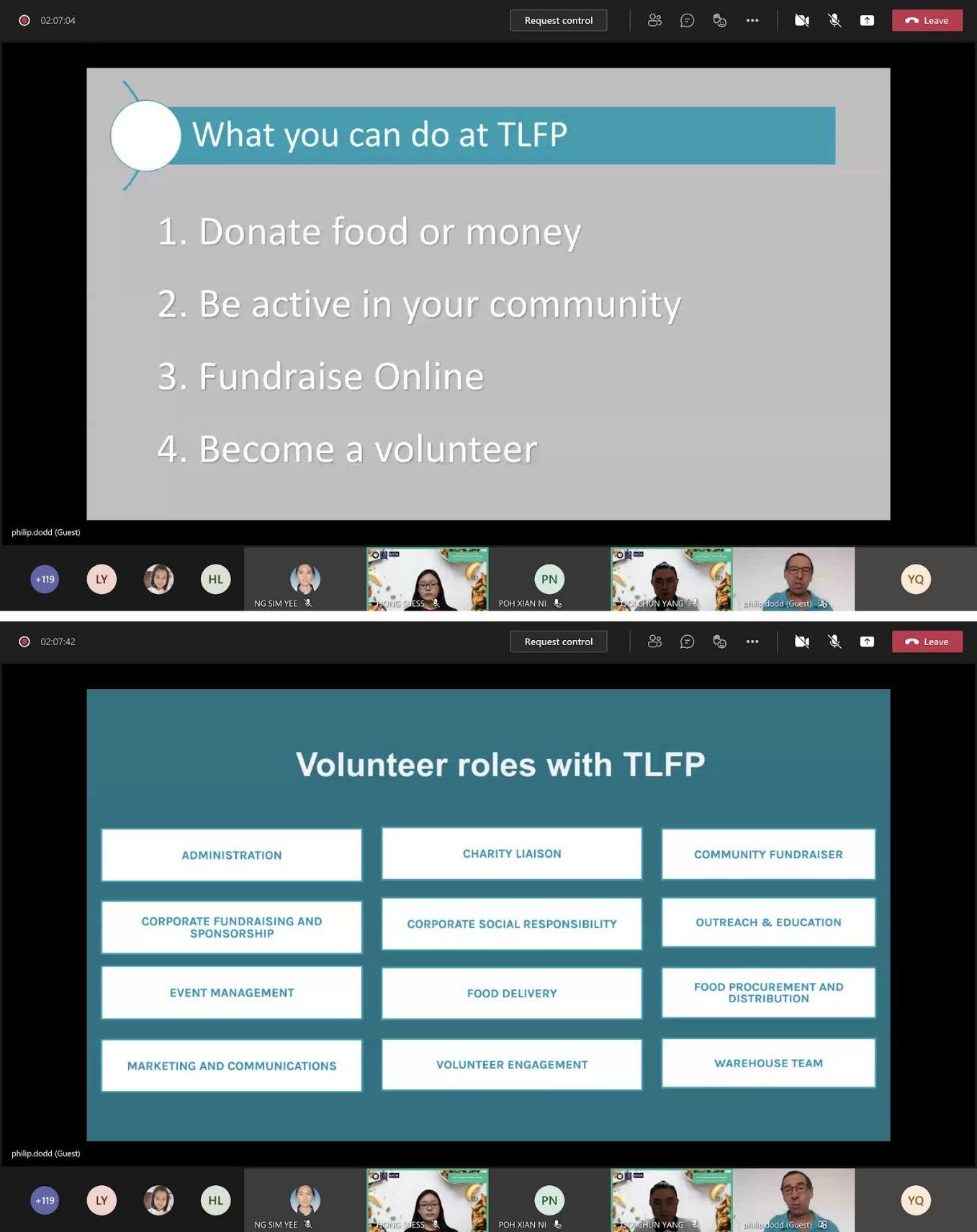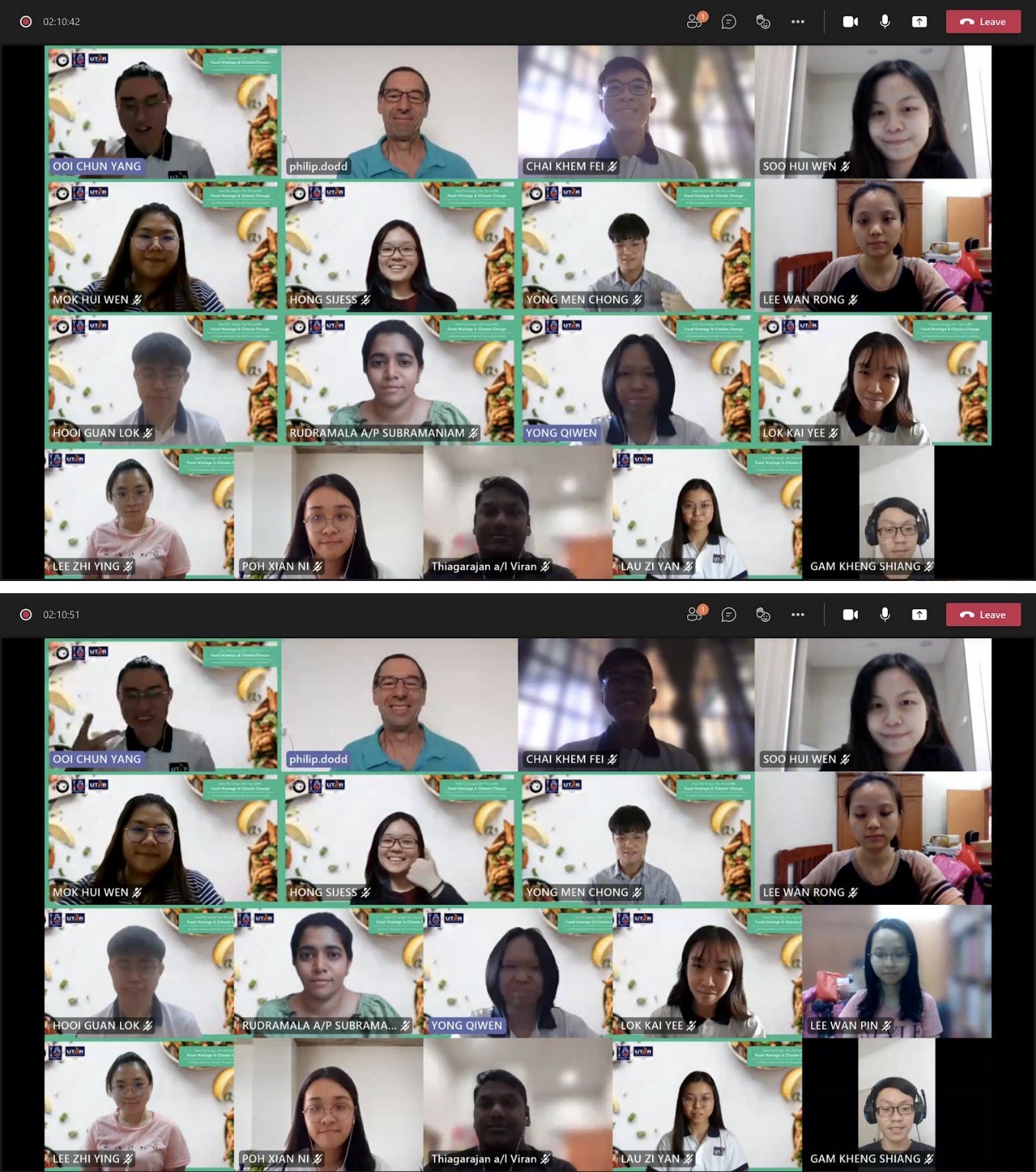
Lessons from food wastage by TLFP

Dodd (in blue) sharing some facts on food wastage as Hong (bottom right corner) listens
‘Feed the hungry, not the landfill’, the phrase that attracted 141 participants’ attention at the online interactive talk, titled “Food Wastage and Climate Change” organised by GIVE Project of Community Service Society of Sungai Long Campus on 27 February 2021 via Microsoft Teams.
The online talk aimed to raise public awareness on the causes of food wastage and its exacerbated impact on the environment. Various issues were highlighted in the online talk, especially on food waste occurring locally and internationally; the effects of food waste on climate change; global hunger and urban poor, and feeding the urban poor.
“The GIVE project has always encouraged its members to give back to the community, and some of the activities we have done in the past till now were volunteering in animal shelters and collaborating with soup kitchens to give out free meals to the homeless. However, when the pandemic struck and physical activities were prohibited, we shifted our focus to raising awareness among the public. Today we focus on food wastage and its effect on the planet, environment and the community,” explained Organising Chairperson Hong Si Jess.
She added, “I hope with this online talk, participants will be able to have a more constructive view of the urban food wastage, be more interested in volunteerism, or even be inspired to start a non-profit organisation of your own that will benefit the community.”
Invited to speak at the online talk was Philip Dodd, a volunteer from The Lost Food Project (TLFP). He started by sharing some startling facts on food wastage and its effects. “Many are not aware, but 30% of the food grown on farms is never eaten and over 800 million people in the world are malnourished. If we could save all the ‘lost’ (thrown away) food in the world, we could feed 3.2 billion people and that is four times the number of hungry people,” said Dodd.
“That’s not all. Food wastage does impact climate change because food waste contributes to increasing greenhouse gas (GHG) emissions (methane) in landfills. In addition to that, food waste dumped in landfills can be a source of nutrient and pathogens pollution in waterways. When landfill waste degrades and rain rinses the resulting products out, leachate is formed. The black liquid contains organic or inorganic chemicals, heavy metals as well as pathogens; it can pollute the groundwater and therefore present a health risk. In fact, about 11% of all the greenhouse gas emissions that come from the food system could be reduced if we stop wasting food. Globally, if food waste could be represented as its own country, it would be the third-largest greenhouse gas emitter, behind China and the United States (U.S). Not to mention, land-use and biodiversity are equally affected because trees are being cut down in favour of land to grow or dispose of food. Produced but uneaten food occupies almost 1.4 billion hectares of land; representing nearly 30% of the world’s agricultural land area,” explained Dodd.
“What about the situation in Malaysia? 3,000 tonnes of edible food is wasted daily in Malaysia, and this amount of food is equivalent to the weight of approximately 1,200 Borneo elephants and can feed up to 2 million people (that’s more than the entire KL population). What is more astonishing, is that food also constitutes the biggest waste in landfills in Malaysia, which is 44.5%, followed by plastic at 19%. Households produced the largest food waste at 38% compared to wet markets (24%), restaurants (23%) or hotels (7%). The average Malaysian throws away 1.64kg of waste daily, compared to the worldwide average of 1.2kg,” said Dodd.
He also explained that ‘lost’ food also affect resources, for instance when one throws away an unused egg into the trash, 180 litres of water is wasted, whereas approximately 50,000 litres of fresh water is used to produce 1kg of beef. “Apart from water, bees are also very important for food production. Bees pollinate 80% of the world's plants including 90 different food crops. One out of every three or four bites of food you eat is thanks to the bees. However, bees and insects are at risk of extinction. More than 40% of insect species are declining and a third are endangered. The die-offs are happening because farmers are using more pesticides to protect crops. Insects are also losing their habitats to farming and urbanisation. Three-quarter of the world's crops are pollinated by insects, so extinctions could have major impacts on not just human food security and economics but also for biodiversity and the health of ecosystems in general,” explained the speaker.
At the interactive session, Dodd and participants discussed ways to improve society’s behaviour to remedy food wastage management and feed the urban poor. He also shared the effects of the pandemic that affected their food supply and the importance of being agile, flexible and hard working to find opportunities and solutions.
“When the pandemic struck, we immediately lost access to the food we rely on overnight, for instance from the Pasar Borong in Selayang, which two-thirds of the food donated comes from there. The market had to close because of the pandemic. In those times, we also received many other organisations and charities asking for help on food because some people had no income to buy food. At that moment, we realised that we just had to be flexible and find solutions and new donors. We are very thankful because Malaysia has a culture of helping and we are grateful because many people donated food and money to us,” said Dodd.
He also shared his thoughts on certain countries that have created legislations that would require supermarkets to find a use for foods that are still good to eat. Meaning, these supermarkets could donate these foods to the charities and communities that are in need.
Participants who wished to contribute more were also encouraged to join TLFP, through food and money donations, be a volunteer, raise funds online, and even be active in the community. “To those who wish to join the TLFP, our volunteer roles are wide, including administration, charity liaison, community fundraiser, corporate fundraising and sponsorship, corporate social responsibility, outreach and education, event management, food delivery, food procurement and distribution, marketing and communications, volunteer management, and warehouse team,” said Dodd.
“As individuals, there are many we can do to prevent food wastage. The most basic of all is to finish your meal, meaning take the right amount of food. If you have more, always share your food. Make a shopping list when you buy your groceries and plan how you want to prepare and store them so none is wasted. Finally, we come to the practice of reusing, refusing (plastics for instance), and recycling,” said Dodd.
The Lost Food Project (TLFP) is a Malaysian not-for-profit organisation dedicated to a sustainable future by rescuing ‘lost’ food and finding it a new home with people who need it most. TLFP prevents quality, nutritious food and other surplus goods from going to landfill and redistributes this food and other essential items to those in need – regardless of religion, gender, age, disability or ethnic group.

The roles of an individual in reducing food wastage

Slides on a volunteer’s roles with TLFP

A group screenshot of Dodd (top row, second from left) and participants at the end of the online talk
© 2021 UNIVERSITI TUNKU ABDUL RAHMAN DU012(A).
Wholly owned by UTAR Education Foundation Co. No. 578227-M LEGAL STATEMENT TERM OF USAGE PRIVACY NOTICE